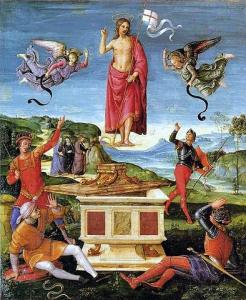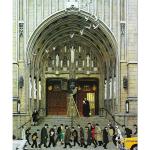 In Stephen Jay Gould’s short book Rocks of Ages: Science and Religion in the Fullness of Life he outlines the concept of non-overlapping magisteria (NOMA), an important concept in the discussion of science and Christian faith. On one level, the principle of NOMA is embraced by many religious scientists, including those with strong theological commitments (and that would include me). Gould calls it “bench-top materialism.” These scientists tend to …
In Stephen Jay Gould’s short book Rocks of Ages: Science and Religion in the Fullness of Life he outlines the concept of non-overlapping magisteria (NOMA), an important concept in the discussion of science and Christian faith. On one level, the principle of NOMA is embraced by many religious scientists, including those with strong theological commitments (and that would include me). Gould calls it “bench-top materialism.” These scientists tend to …
hold that the “deep” questions about ultimate meanings lie outside the realm of science and under the aegis of religious inquiry, while scientific methods, based on the temporal invariance of natural law, apply to all potentially resolvable questions about facts of nature. (p. 84)
Certainly I assume that scientific methods based on the natural laws we know and are yet uncovering will apply to the questions about facts of nature. This informs the way I view the fossil record, and the information contained in the genomes of plants, animals, and all forms of life. There is a remarkable coherence between chemistry, physics, biology, … all the sciences. I see no reason to assume that God must have moved outside the natural realm to form the marvelous diversity of life we observe around us and find evidence for in the past.
Gould goes a step further however.
The first commandment for all versions of NOMA might be summarized by stating: “Thou shalt not mix magisteria by claiming that God directly ordains important events in the history of nature by special interference knowable only through revelation and not accessible to science.” In common parlance, we refer to such special interference as “miracle” – operationally defined as a unique and temporary suspension of natural law to reorder the facts of nature by divine fiat. … NOMA does impose this “limitation” on concepts of God, just as NOMA places equally strong restrictions upon the imperialistic aims of many scientists (particularly in suppressing claims for moral truth based on superior understanding of factual truth in any subject). (p. 84-85)
And this is a step too far.
Science is ideally suited to uncover the laws that govern the behavior of material systems and to trace the chain of events that led to the world around us. Call it “bench-top materialism” if you wish. The power of scientific explanation is overwhelmingly convincing, instead of unrelated facts there is a coherent story. Complexity (and life is undeniably complex) highlights questions and current ignorance – but it isn’t really evidence for “miraculous” intervention.
On the other hand Gould’s first commandment seems to rule out the miraculous altogether. Even miracles such as those recounted in the Gospels, the healings, feeding the five thousand, calming the storm, the resurrection, are out of bounds. This raises a number of problems.
First, the Bible relates the story of a personal God in relationship with humans created in his image. The interactions of a personal God with his creatures are not explicable through natural mechanism alone. It isn’t special interference but the normal course of such a relationship. The personal is brought to earth in Jesus.
Second, God is sovereign over creation and has a plan for the future. Jesus is not a good moral teacher wandering around dispensing truths. He is enacting the mission of God, and this isn’t neatly separated from the natural world. “What kind of man is this?” his disciples wonder, “Even the winds and the waves obey him!” The healings performed by Jesus are another powerful example. These are not psychosomatic, with natural explanation, or the actions of a tinkerer demonstrating his supernatural power (i.e. divinity). They are an enactment of the coming kingdom of God and the constitution or reconstitution of the people of God as it is meant to be.
 But most importantly, Christianity is a resurrection religion. The miracles performed by Jesus are significant, but not crucial. Timothy Luke Johnson in his recent book Miracles: God’s Presence and Power in Creation writes:
But most importantly, Christianity is a resurrection religion. The miracles performed by Jesus are significant, but not crucial. Timothy Luke Johnson in his recent book Miracles: God’s Presence and Power in Creation writes:
Are the claims of Christians for Christ based on the miracles he performed? On the evidence of the rest of the New Testament outside the Gospels (and Acts), we must say no. Everywhere in these writings, Jesus is understood to be Lord and God, but his resurrection/exaltation, rather than his healings and exorcisms, support that understanding. And although the history of apologetics might lead us to think otherwise, the basis of faith has remained the same from the time of the New Testament to the present. To put it bluntly, even if Jesus has worked all the wonders ascribed to him, and had not been raised, he would be only a great prophet of the past, not the life-giving spirit whose power and presence changes everything in the present.
Paul could not be more emphatic when he states, “If Christ has not been raised, then our proclamation has been in vain and your faith has been in vain. … If Christ has not been raised, your faith is futile and you are still in your sins” (1 Cor. 15:14,17). It follows as well that Christian faith would survive even if all of the miracles attributed to the human Jesus were somehow discredited, for the same reason: our faith, (like Paul’s and like Peter’s) is based not on those miracles but on the sign and wonder that is Jesus’ resurrection and exaltation as God’s Son. (pp. 169-170)
We believe the miracle accounts given by the Gospel writes because they are part of a coherent narrative of the life, death, resurrection and exaltation of Jesus. But it is the ultimate reality of resurrection, most certainly a ‘miraculous’ event, that provides the foundation, first in Jesus and ultimately of all in the age to come. This world is not the sum total of reality. The future is beyond our comprehension, and certainly beyond our science.
Thoughts?
Is the Resurrection ultimately the only miracle related in Scripture that really counts?
If you wish to contact me directly you may do so at rjs4mail[at]att.net.
If interested you can subscribe to a full text feed of my posts at Musings on Science and Theology.















